Eating disorders are one of the most complex mental health diagnoses, so it makes sense that coming up with a consistent definition of recovery is equally tricky. Equip’s newest research—featuring nearly 500 people either in recovery from or seeking treatment for an eating disorder—sheds light on the intricacies of the recovery process and what recovery means to different people. Below we’ll unpack some key learnings and insights, touching on the treatment experience, relapse factors, individual definitions of recovery, and more.
Defining recovery: a spectrum of experiences
Eating disorder recovery remains a deeply personal and evolving concept. But when we asked survey respondents what recovery meant to them, certain themes emerged. Most said that recovery means, among other things:
- Developing a positive relationship with food and body
- Freedom from disordered thoughts
- Physical health
However, respondents also reported that challenges can persist even into recovery, and that they sometimes don’t feel “fully” recovered. Among this subset, 93% said they still struggled with disordered behaviors, 89% said they still had disordered thoughts, and 92% said they still have a challenging relationship with food.
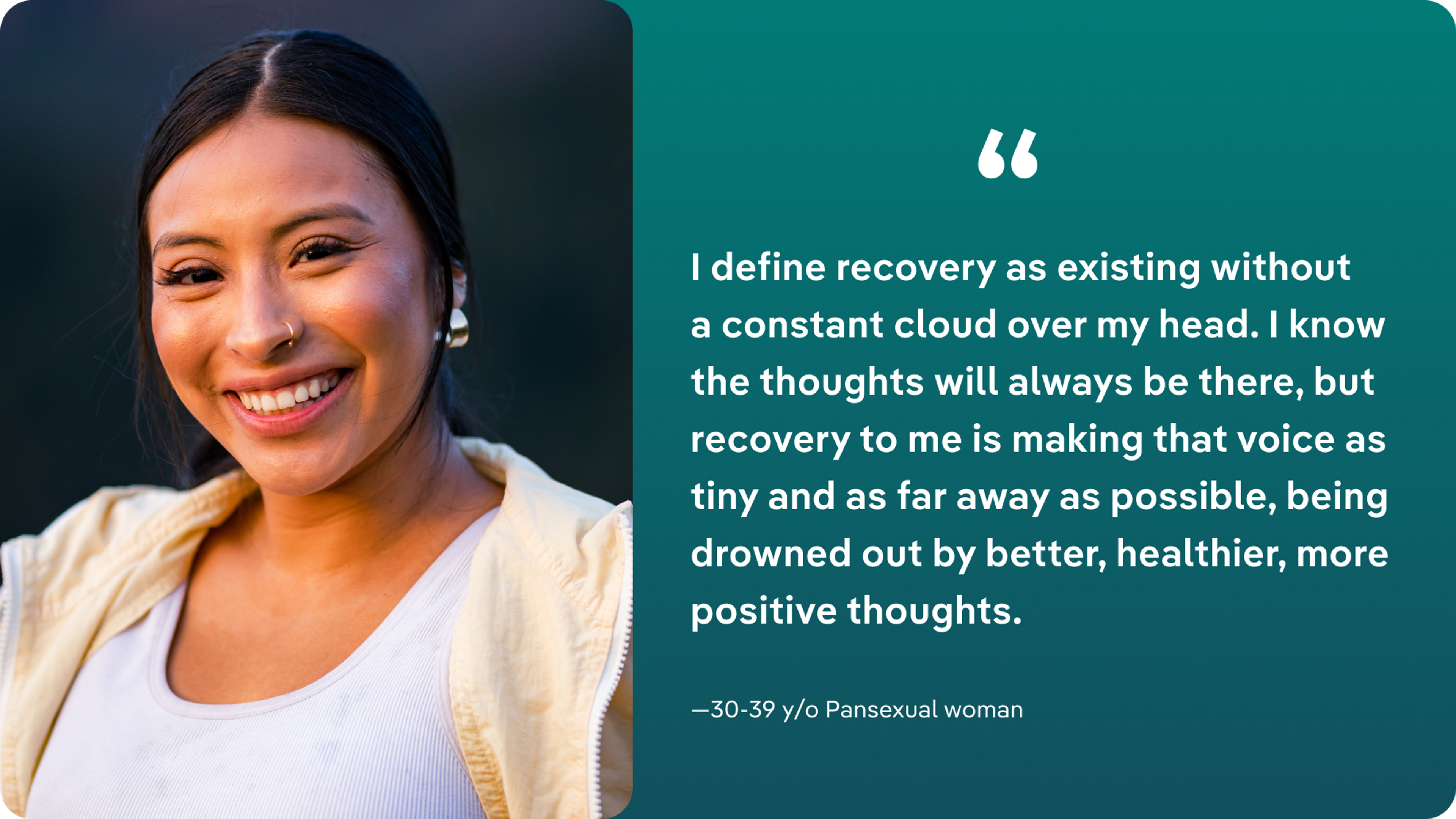
Real people define recovery
Below are some excerpts from an open-response question that asked respondents to define recovery.
“I define recovery as existing without a constant cloud over my head. I know the thoughts will always be there, but recovery to me is making that voice as tiny and as far away as possible, being drowned out by better, healthier, more positive thoughts.” -30-39 year-old pansexual woman
“Recovery, I hope, will be one through which I can take my life back and live not crippled by food and body image preoccupations, fostering health in both my body and my mind through good eating habits and self-care. I also do hope to develop self-compassion, build meaningful connections with people, and live a full and purpose-driven life filled with joy.” -18-29 year-old woman
“I will feel fully recovered when my eating habits and routine no longer involve the so-called ‘binge/purge’ process. I still experience these encounters less than before. When I can go sustained periods of time—months/years—then I will feel confident of recovery” -40-49 year-old bisexual man
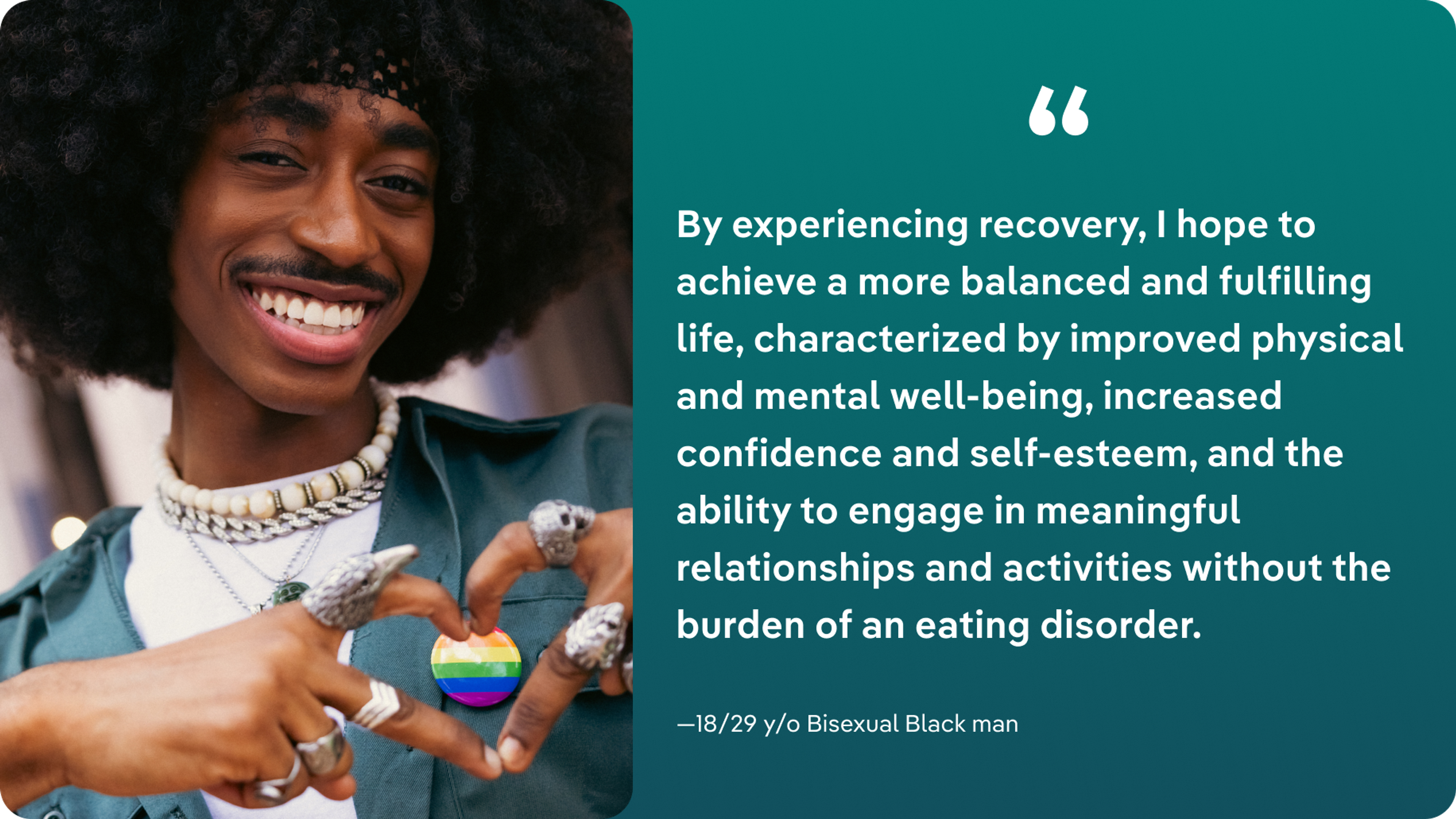
Treatment motivation and effectiveness
We also asked people about their motivation for seeking treatment and what treatment they sought. Encouragingly, 64% of respondents cited desire for recovery as a motivating factor, which is contrary to the widespread idea that people with eating disorders don’t want to get better. Other motivating factors were mental health concerns (69%), and physical health risks (65%).
Outpatient therapy was the most common treatment setting (67%), followed by inpatient care. Notably, treatment satisfaction was higher among those with strong support networks and access to evidence-based interventions. The most important aspects of treatment that came up again and again were:
- Multidisciplinary care: Therapists, dietitians, and psychiatrists were key members of treatment teams, with many respondents citing their empathy and personalized approaches as pivotal.
- Support from others. Nearly half (46%) of those discharged from treatment cited peer support and family involvement as aids in recovery, but the treatment team was the top contributor (78%).
- Therapeutic tools: Coping strategies, such as challenging negative thoughts and developing resilience, played a critical role in progress.
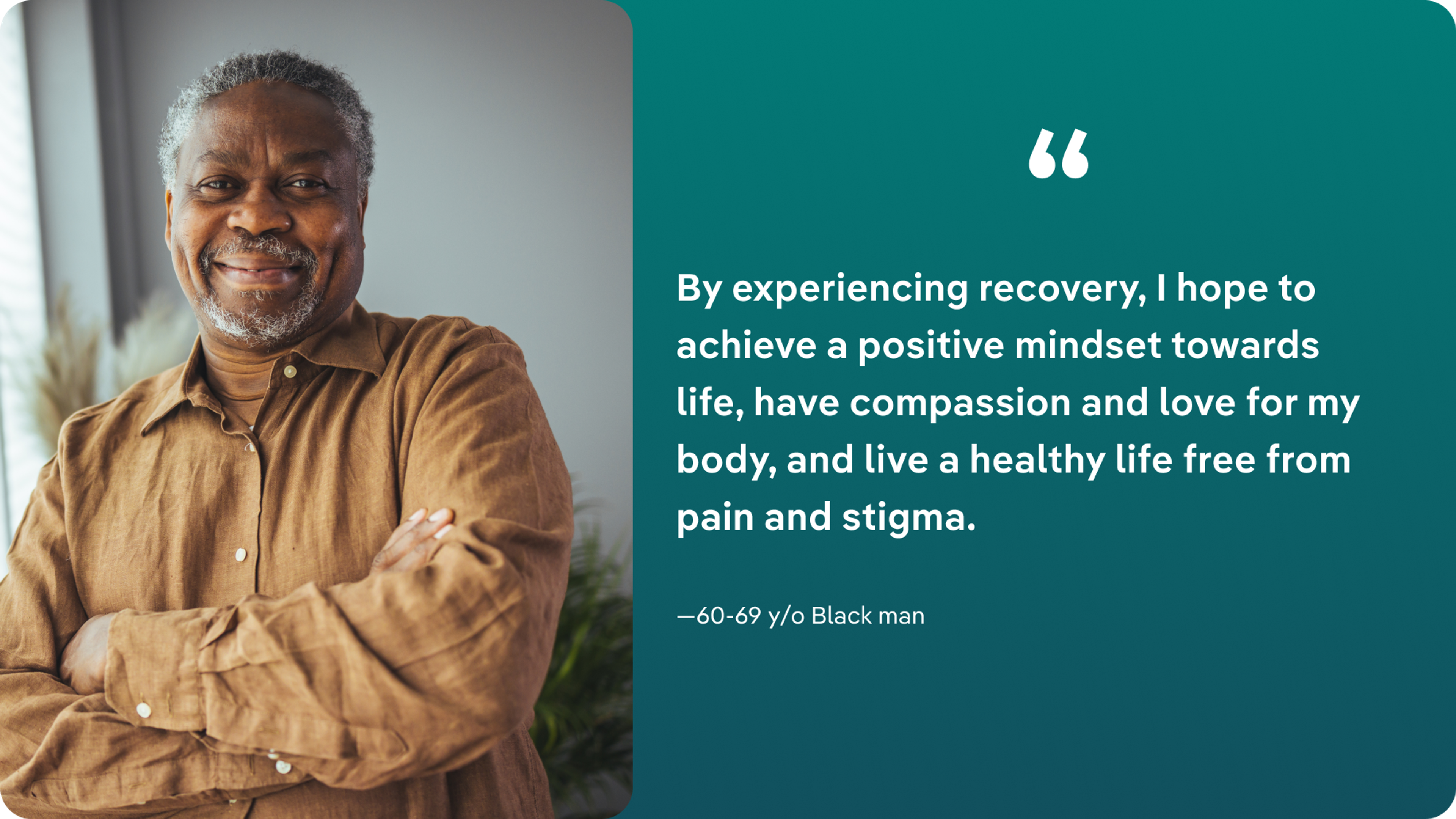
Barriers and relapse concerns
Our research highlights widespread concerns about relapse, with 88% fearing it and 51% having relapsed multiple times. Stress, societal pressures, and co-occurring mental health issues are common triggers.
Among those currently in treatment, 40% worry about post-discharge relapse, citing stress, body image struggles, and past relapses. While most (78%) respondents had a positive treatment experience, the high relapse concerns emphasize that recovery isn’t linear—and that treatment must include relapse planning to support lasting recovery.
Relapse insights
Every relapse is different, but some patterns emerged among respondents.
- Timing: Most relapses occurred within two to six months of discharging from treatment.
- Stigma and isolation: Marginalized groups, including LGBTQ+ and racial minorities, reported higher vulnerability to relapse due to systemic inequities and lack of affirming care.
- Gender differences. While men and women share similar relapse rates, women more frequently report disordered thoughts, mental health, stress, and social media as a concern.
- Body image. Body image concerns were more frequently mentioned by younger respondents (18–29 years) across all genders.
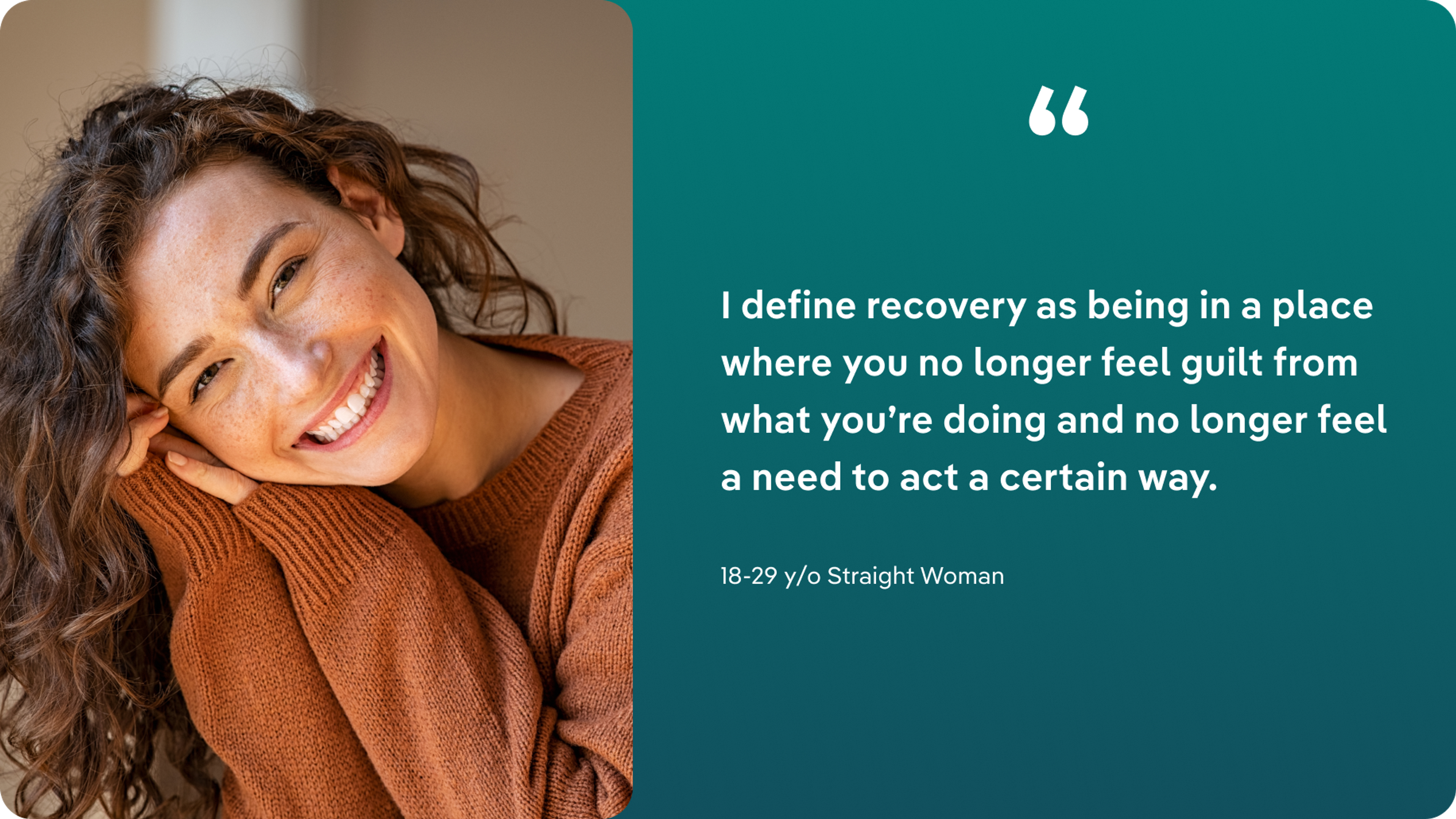
Real people speak about relapse
“Looking at myself in the mirror or in unflattering photos makes me feel like completely relapsing. Plus, food costs cause me to think that eating is optional.” -18-29 y/o queer man
“When I feel overwhelmed by stress, loneliness, or sadness, I notice those feelings can make me more vulnerable to old patterns. It's hard to resist the urge to cope in unhealthy ways during those moments.” -30-39 y/o Black woman
“It feels unavoidable. A lot of the social media content I interact with serves as a huge trigger because they are all so thin and beautiful. Even the thought of shopping can trigger a relapse since I have to see how my sizes fluctuate (even though I know sizing isn't standard—at all).” - 18-29 y/o Asian woman
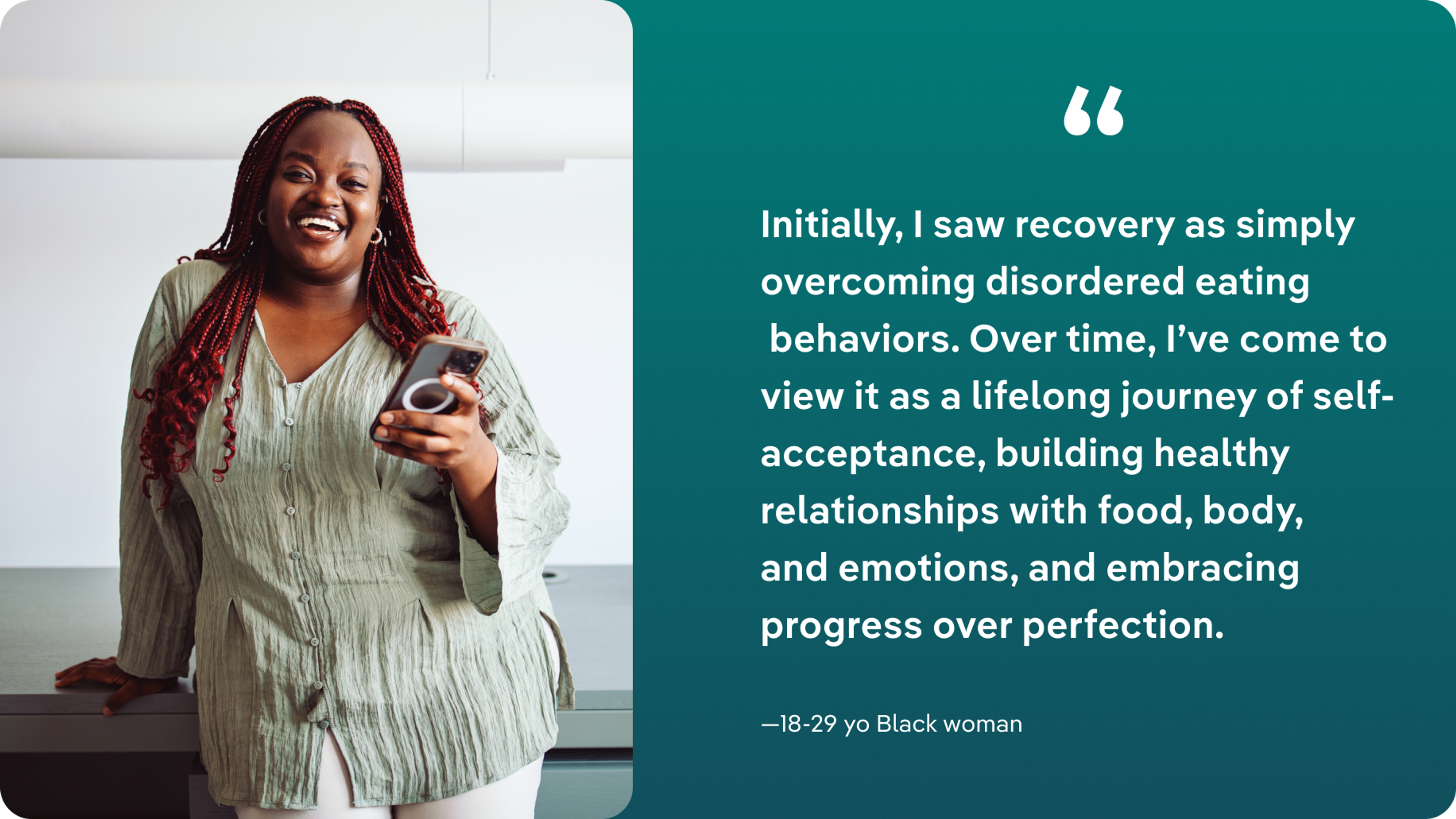
Spotlight on marginalized groups
Our study highlighted disparities in treatment experiences among marginalized populations, like LGBTQIA+ individuals and racial minorities:
LGBTQ+ community
Stigma and lack of gender-affirming care were significant barriers to treatment, and family support emerged as a critical factor for recovery. Nearly half (44%) of survey respondents identified as LGBTQIA+, highlighting the disproportionate impact that eating disorders have on this community.
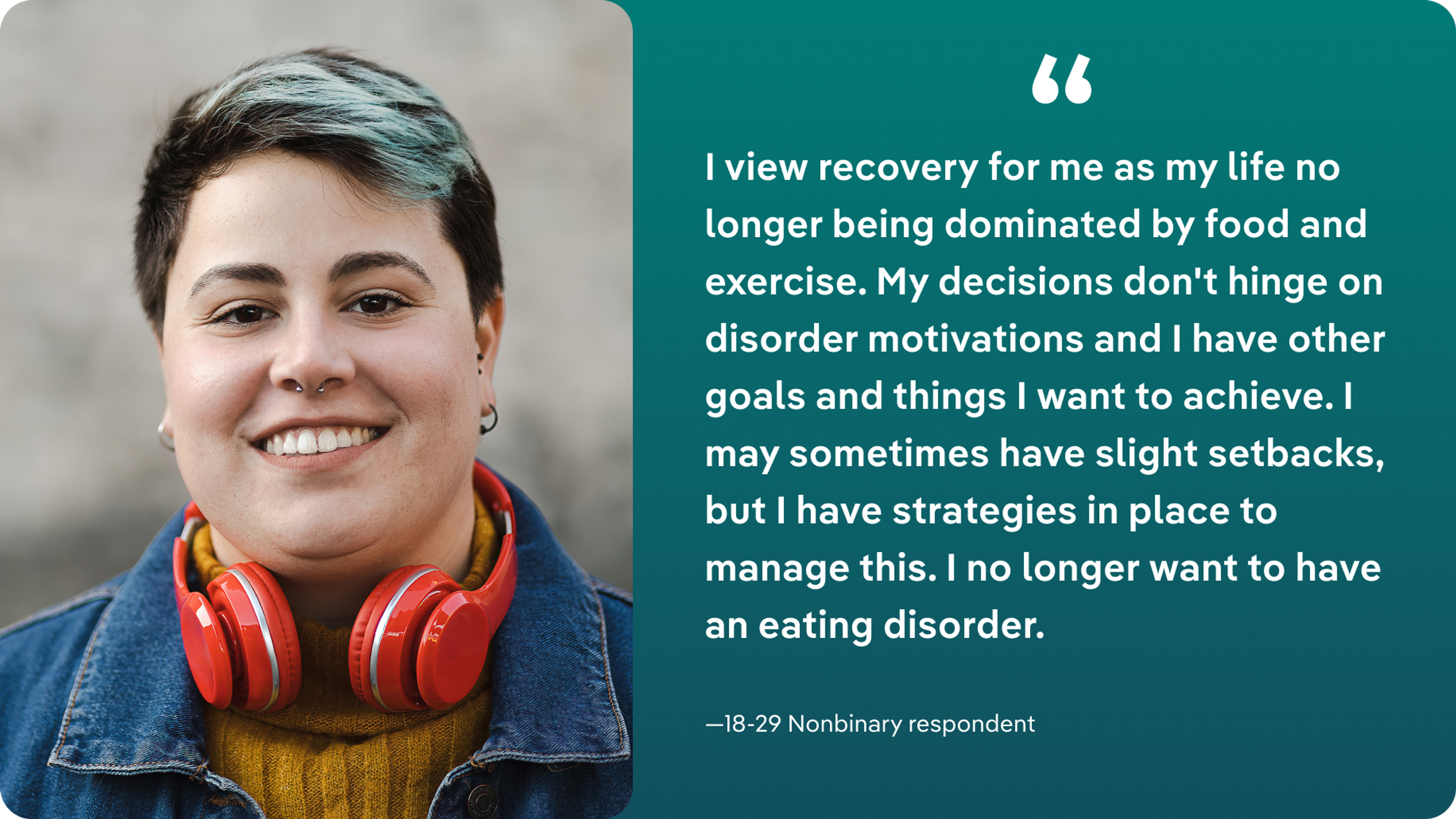
Racial minorities
Black respondents were more likely to rely on intensive treatment, and reported positive outcomes linked to family involvement and community-based support.
BIPOC individuals were twice as likely to cite pressure to recover fast and unrealistic goals as a barrier to treatment progress compared to white individuals (10% vs. 5%).
Considering that +50% of LGBTQIA+ youth have an eating disorder, and that BIPOC individuals are half as likely to be diagnosed or receive treatment, there’s work to be done in supporting these communities better in treatment. Learn more about eating disorders in LGBTQIA+ and BIPOC populations.
Looking ahead: a call to action
The path to eating disorders recovery is challenging, but recovery is both possible and worth it for everyone affected by an eating disorder. The perspectives shared in our survey reveal these challenges, as well as the resilience and hope within so many people struggling.
Sustainable recovery for everyone requires:
- Accessible care: Affordable, evidence-based treatments tailored to individual needs.
- Community support: Peer networks and family involvement are crucial for lasting change.
- Holistic approaches: Treatment that addresses mental, physical, and emotional health, as well as co-occurring conditions, is essential.
This research is a powerful reminder of the ongoing work needed to support those on their recovery journeys. By amplifying diverse voices and addressing systemic barriers, we can build a future where it’s possible for everyone to not only achieve recovery, but maintain it long-term as well.
Learn more about accessible, evidence-based eating disorder treatment at Equip.








